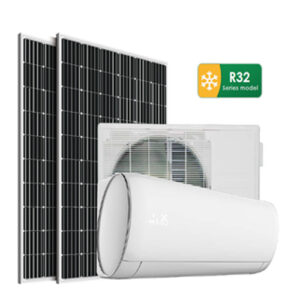
Is it possible to run AC on solar power?
Yes, it is possible to run an air conditioner (AC) on solar power. Solar air conditioning systems use solar panels to convert sunlight into electricity, which can then be used to power the AC unit.
Are solar air conditioners any good?
- Reduce electricity costs: Nowadays, with the gradual increase in electricity charges, solar energy, as a free resource, can significantly reduce electricity costs. The electricity expenditure of several hundred dollars per month in the past is highly likely to be halved after the addition of solar air conditioners.
- Independent and hybrid power supply: In areas with unstable power supply or remote areas, solar air conditioners can operate independently without being restricted by the power grid. In areas with sufficient power supply, solar energy can be used to supplement the municipal power supply to reduce usage costs or municipal power supply can be used in places with weak sunlight to ensure the continuous usability of the air conditioner.
- Easy installation and maintenance: Its system structure is relatively simple, the installation process is more convenient, and the daily maintenance cost is usually lower.
- Silent operation: Compared to the compressors of traditional air conditioners, solar air conditioners usually operate more quietly. This is because solar air conditioners are equipped with DC-driven variable-frequency compressors, which can reduce motor energy consumption. Moreover, small-load operation can meet the demand, and the low-frequency start-up of the compressor can make less noise and achieve silent operation.
- Long lifespan: Also because it can support low-load operation, high-quality solar air conditioning equipment usually has a service life of 20 to 30 years.
What does a solar AC consist of?
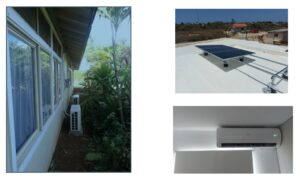

What is the difference between solar AC and normal AC?
| Difference | Solar AC | Normal AC |
| Power Source |
|
Power supply from the power grid only |
| Cost |
|
|
| Noise Level | Silent operation, thanks to the lower-frequency start-up of the DC (direct current) compressor | More noise, caused by the higher-frequency start-up of the AC (alternative current) compressor |
| Service Life | Longer service life, usually up to 20 – 30 years or even longer, because to the low-load operation | Shorter lifespan, can be used for 10 – 15 years due to its limited capability of high-load operation only |
| Energy Independence | Can be energy independence | Completely relies on the external power grid |
| Applicable Scenarios |
|
Areas with abundant and stable power supply |
| Environmental Friendliness | More environmentally friendly and lower carbon emissions | Less environmentally friendly and increasing carbon footprint |
How does solar AC work?
DC solar air conditioner
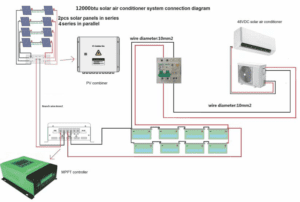

- Solar panels collect solar energy and convert it into DC power.
- When the DC power passes through the controller, it regulates the direct current (DC) to ensure the stable operation of the air conditioning system.
- In the outdoor unit, the compressor compresses the refrigerant, increasing its pressure and temperature; the condenser cools and condenses the high-temperature and high-pressure refrigerant gas into a liquid, releasing heat; the fan helps with heat dissipation and improves the heat exchange efficiency of the condenser; and the expansion valve controls the flow and pressure of the refrigerant, reducing its pressure and temperature.
- In the indoor unit, the evaporator evaporates the low-temperature and low-pressure liquid refrigerant; the fan blows the air cooled by the evaporator into the room for air circulation; the air filter filters out dust, pollen, and other impurities in the air, providing clean air.
AC/DC hybrid solar air conditioner
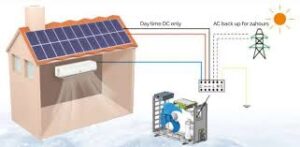

What functions does solar AC have?
Similar to the traditional AC, solar AC can perform functions such as cooling and heating.
What is Btu? How to convert Btu to Watts?
- Btu stands for British Thermal Units. Its is a measurement of the amount of energy an air conditioner uses. Approximately, one Btu is the energy released by the burning of a match.
- Btu * 0.293 = Watts
How many solar panels do I need to run a solar AC?
It depends on the amount of power you require. Generally, each solar panel represents 450w.
The power options of an off-grid solar system ranging from 9000 Btu to 24000 Btu are the most popular. They typically need 8 to 21 pieces of solar panels, specifically:
This is only a rough reference. You can consult our professionals to determine.
How many AC can run on solar power?
It depends on the capacity and quantity of the solar panels you possess, as well as the energy consumption of each AC unit.
For instance, if you have 30 solar panels each with a capacity of 450w, the total solar energy supply including losses could be approximately 10.4kw. You can choose one of the following options:
- Run 3 to 4 AC units of 9000 Btu
- Run 2 to 3 AC units of 12000 Btu
- Run 1 to 2 AC units of 18000 Btu
- Run 1 AC unit of 24000 Btu
How to convert normal AC to solar AC?
Core components such as the compressor, solar panels, and the power control section including the controller and AC/DC modules need to be replaced because the working principles of the normal AC and the solar AC are significantly different.
Common components like the evaporator, condenser, fan, connection parts, sensor, casing, and frame may be reused in solar AC. However, these components do not guarantee full adaptability and cost relatively little compared to the core components.
Does a solar AC need a battery?
Solar air conditioners (AC) do not necessarily require a battery to operate. However, you can incorporate a battery into the solar air conditioning system according to your requirements.
- Generally, when purchasing a hybrid solar air conditioner, which is the most popular option for most people, some individuals might opt to buy batteries as an accessory.
- If you are considering a DC-only solar air conditioner, the majority of people do not purchase batteries along with it. (we do not recommend this type, and there are few such options available on the market)
How to run AC on solar without a battery?
Most of people do not purchase a battery for their solar air conditioners (AC). If your solar air conditioners are AC/DC hybrid, they can be powered by DC (direct current) power from the solar panels when there is sufficient sunlight and AC (alternative current) power from the power grid when sunlight is insufficient.
You may also be interested in the pages below
- Alibaba – Gidita Life
- Ecer – Gidita Solar
- Amoy Brand – Gidita Solar
- Gidita Solar
- Solar System & Application FAQs
- Distinction Between Off-Grid, On-Grid, and Hybrid Solar System? No More Confusion, all in 1 Basic Article!
- 6 Types of Solar Water Pumps Systems – Powerful Irrigation And Water Supply?
- Why Balcony Solar Systems Become Booming All the World? Your Balcony can be a 100% Powerful Energy Hub!
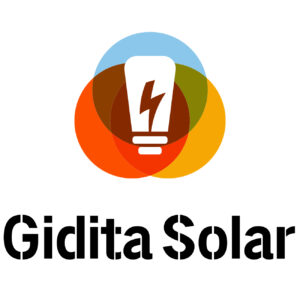

Xiamen Geno Industry Co,. Ltd.
Tel / WhatsApp: +86 13906057667
Email: cathy@geno-china.com
